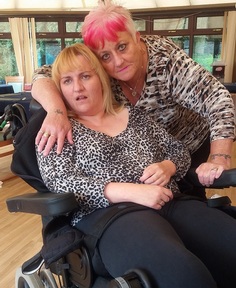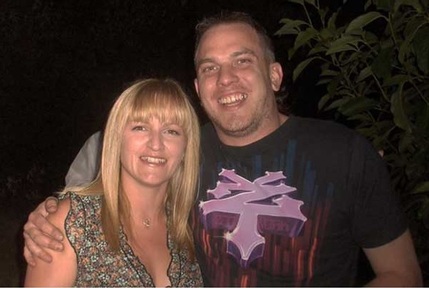Alzheimer's at 30: Mum's heartbreak as bedbound daughter cannot speak or recognise her
“It breaks my heart” says the mother of Carla Bramall who is bedbound in a care home, unable to make eye contact or recognise her family because of a rare form of Alzheimer’s.

“Watching my own child go through this is indescribably painful”, says Carla's mum Rita Pepper about the 39-year-old, who receives round-the-clock care at Pathfields Lodge nursing home in Wellingborough, after developing early onset dementia.
Symptoms began at 30
The 61-year-old says Carla was just 30 when she began showing the symptoms of Alzheimer’s disease in 2007. Her daughter became unable to cope with having a bank account or filling out forms and became heavily dependent on her.
Mrs Pepper recognised the symptoms of dementia immediately as Carla’s father Barry had died from early onset Alzheimer’s in 1993 at the age of 43 and had displayed the same type of behaviour.
Carla was eight, when her dad was diagnosed and 15 when he died. Mrs Pepper had tried to prepare herself for the probability one of her children may develop the condition after the family were informed that it was a inherited- ‘familial’ form of Alzheimer’s disease - accounting for less than one per cent of Alzheimer’s cases.
Carla and her brother Lee had a 50/50 chance of having the same rare faulty gene as their father. Rita says: “Every day after I found out about my children’s risk I would look at them and think ‘which one?’.

Carla, a mum of two herself, a former hairdresser who then worked as a jury officer at Northampton Crown Court, was formally diagnosed with Alzheimer’s in 2013 at the age of 36 – the same age as her father.
“Carla deteriorated so quickly. She no longer even lifts her head when we’re there or makes any eye contact. She can’t walk or speak and needs to be fed with soft food.
“I visit her every day and I just hope that one day she might recognise me again, but I cry every time I come out the home. She has seizures regularly which only adds to the distress.”
Carla has an 18-year-old son and 12-year-old daughter and it is Rita who plays the role of mother to her grandchildren bringing them up while making daily trips to see Carla who continues to deteriorate.
Carla's children rarely visit now
“My grandchildren rarely see Carla now because she is so different to how she used to be. Last time I took them to visit her they left in floods of tears.
“My granddaughter knows her mum is ill but it’s hard for her to understand, she’s only just realising that she won’t get any better.”
Mrs Pepper says: “It’s in similar circumstances that Carla and Lee visited their dad. I remember when Barry died Carla was screaming ‘don’t close your eyes dad’.”
Crashing the car was 'final straw'
Up until three years ago Carla was still driving and Rita later found out her grandson had been helping her to indicate and giving her directions, as she was unable to do so herself.
Then one day, while Carla’s young daughter was a passenger, she crashed her car.
Though both escaped with minor cuts and bruises, it was the ‘final straw’ for Rita who says she had been unable to get a formal diagnosis from doctors at her local hospital despite the genetic link.
Rare faulty PSEN1 gene
Mrs Pepper took Carla to the National Hospital for Neurology and Neurosurgery in London, where Barry had been diagnosed and the family’s worst fears were confirmed. The family has a mutation in the PSEN1 gene, which affects around 450 families globally and can cause symptoms to appear as early as 30 years of age. Alzheimer’s has already claimed the lives of their grandfather and their uncle, while their cousin, who is also under 40, is also currently in a care home.

‘Gut-wrenching’ feeling for brother
Carla’s brother, Lee, a father of one is now 37 but has still not found out if he possesses the family’s faulty gene, but has so far not displayed any symptoms.
Lee Bramall, who works as a mechanic, had convinced himself that he would be the one to develop dementia and Carla would be safe.
“I’m the spitting image of my dad and for some reason I became convinced it was therefore me who would follow in his footsteps”, says Lee.
Mr Bramall says Carla had told him before if she found out she had Alzheimer’s she wouldn’t want to live.
He says: “It’s even worse knowing she is the one who has it. When she first was showing symptoms, friends would say ‘no it’s just Carla being ditzy’.
"But for me it was a gut-wrenching feeling knowing these were real symptoms and it was happening to Carla. I felt like I was reliving my childhood all over again.
“I see her all the time and we try to keep it normal, but my stomach has been in knots for five years as I see her fading away.”
'Dementia's not just forgetfulness in old age'
“Carla’s story is a perfect challenge to the prevailing misconception that dementia is just forgetfulness in old age”, says Hilary Evans, chief executive at Alzheimer’s Research UK.
Ms Evans adds: “The condition is caused by brain diseases which turn lives and families upside down, and which no one currently survives.
“Alzheimer’s Research UK is leading the fightback to bring an end to the fear, harm and heartbreak of dementia through world-class research projects across the UK and beyond.”
Rita Pepper and Lee Bramall attend support meetings with the Rare Dementia Support group at University College London, which offers help to those with less common forms of dementia.
'All they wanted for Christmas was their mum back'
Rita Pepper says: “I thought by now there’d be new treatments out there but there just isn’t anything available that can slow down the progression.
"I’m desperate for as much research as possible to go into the disease, it might be too late for Barry and Carla but I will spend the rest of my life worrying about my grandkids and I’m not going to be around forever."
Mrs Pepper is raising money for Alzheimer’s Research UK to increase awareness of dementia and the need to find treatments.
She adds: “All my grandkids wanted for Christmas was their mum back, which is something I can’t give them. But donating to dementia research is something I can do for them to fight back.”
She has set up a fundraising page and has raised £860 so far. To donate to Carla's fundraising page click here
Latest Features News
 25-Nov-19
2019 Election: Boris Johnson leaves social care in 'too difficult box' but Labour vows to end 'crisis'
25-Nov-19
2019 Election: Boris Johnson leaves social care in 'too difficult box' but Labour vows to end 'crisis'
 18-Oct-19
Podcast: Wendy Mitchell and dementia: 'My biggest fear is not knowing who my daughters are'
18-Oct-19
Podcast: Wendy Mitchell and dementia: 'My biggest fear is not knowing who my daughters are'
 27-Sep-19
Exclusive: Care minister backs care workers' call for time off to grieve and attend funerals
27-Sep-19
Exclusive: Care minister backs care workers' call for time off to grieve and attend funerals
 19-Sep-19
Podcast: Gyles Brandreth says poetry helps ward off dementia
19-Sep-19
Podcast: Gyles Brandreth says poetry helps ward off dementia
 30-Aug-19
Edinburgh Fringe funnyman joins comics facing toughest audience at care home gig
30-Aug-19
Edinburgh Fringe funnyman joins comics facing toughest audience at care home gig